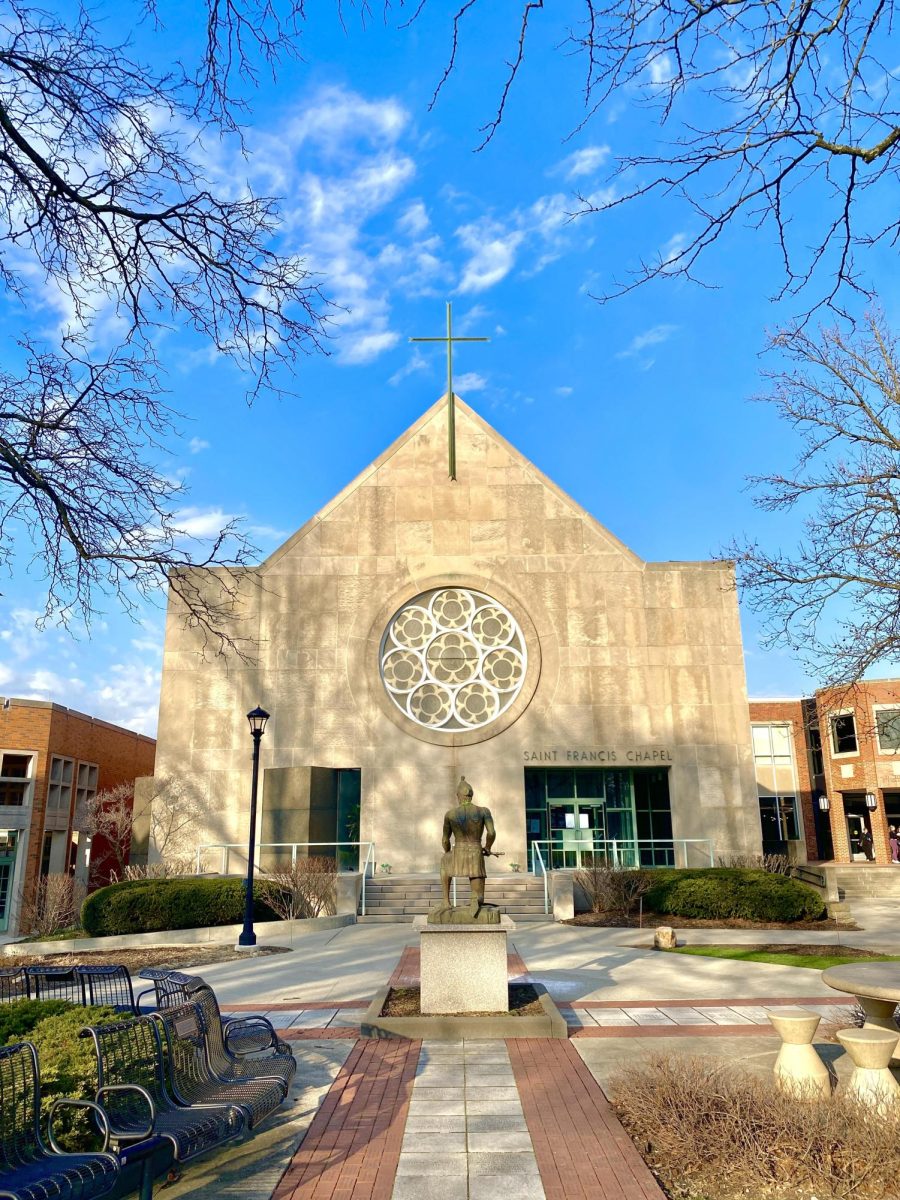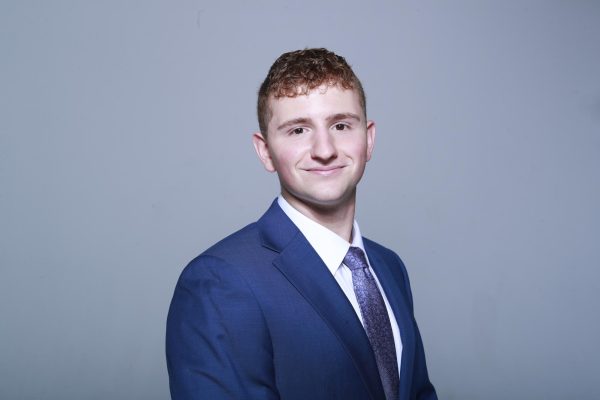For over 137 years, John Carroll University has been educating students in the Jesuit tradition, a Catholic religious order founded by St. Ignatius Loyola in the 16th century which emphasizes education, missions and social justice. However, with a shrinking population of Jesuit priests at JCU (and across the country), others have stepped up to ensure the university does not lose its heritage.
The laity (laypeople) at JCU encompass faculty and staff within the religious community who are not ordained clergy or official religious professionals. These individuals are playing an active role in supporting the university by incorporating Jesuit teachings into their work inside and outside of the classroom.
In the 1960s, the Jesuit’s numbers peaked at about 36,000 members worldwide. In 2022, there were only 14,439 Jesuits left in the world, with 2,046 in the United States and Canada alone. JCU witnessed a similar decline. From 1950 to today, the number of Jesuits on campus has dropped from 38 to nine.
A shift towards lay presidents at Jesuit colleges and universities occurred rather recently. In 2018, Michael D. Johnson served as the first lay president of JCU. However, Johnson’s tenure as president was short-lived as Alan R. Miciak, also a member of the laity, replaced him in 2021. The move toward lay leadership also brought more diversity to these institutions.
Just a year later, on Oct. 14, 2022, Fordham University made history when it inaugurated Tania Tetlow as president, making her the first layperson and woman to lead the university. Rockhurst University and Santa Clara University also inaugurated their first lay and female presidents in 2022.
Through the collective efforts of Jesuit communities and their lay partners, a new chapter is unfolding in the wake of the Second Vatican Council and the call of the laity to holiness. The spirit of Jesuit education is thriving due to the diverse perspectives and dedication of its laypeople. Still, a lack of sufficient lay leadership could spell misfortune for JCU. Nathan Jun, an assistant professor of Philosophy at JCU, warns that there are boxes to check if a university wants to be affiliated with the Jesuits, it can’t be “Jesuit in name only.”
In 2019, Wheeling University (formerly Wheeling Jesuit University) lost its Jesuit affiliation after making substantial cuts to its liberal arts programs; it also lacked the lay leadership and programming to support its Jesuit identity. Jun believes that what happened to Wheeling should be taken as a cautionary tale and he recognizes his agency to ensure JCU does not meet a similar fate.
Jun said, “Simply by virtue of teaching philosophy, I’m contributing to that mission, because of the role of philosophy in a Jesuit education. Given the Jesuits’ 500-year-old tradition of academic excellence, it is really important for people who work at Jesuit universities to be familiar with the mission and the society.”
“I think that the disappearance of Jesuit priests poses more of a challenge to the spiritual dimension of the mission, but it’s also an opportunity for the mission to be taken forward in different ways by different people.” To Jun, laypeople are crucial to the long-term viability of Jesuit universities.
Ryan Mann, an alumnus of and the Assistant Director of Admissions at JCU, said, “This educational system and model…has stood the test of time. It is our (lay people) duty to serve as stewards of this tradition,” and while there may be fewer Jesuits, “their values and ideals are still here for us to implement into every decision we make.”
Mo Reilly, a graduate assistant for Campus Ministry at JCU and resident minister, said that the decline of priests does not mean that “the mission of John Carroll as a Jesuit institution should waver at all,” and Jesuit values “will never go out of style, even if we have a lower number of Jesuit priests and brothers on campus.”
Jurell Sison, assistant director of Campus Ministry at JCU, feels empowered by the contributions of laypeople to the spiritual aspects of the Jesuit tradition. He is confident the “laity will have a tremendous contribution to the future of the church.”
Sison said he is here “to serve our students,” but his personal mission is “to create what St. Ignatius calls contemplatives,” by using his “gifts and skills to help students to acknowledge their own.”
“So what I am doing to contribute to the Jesuit mission is being who I am. Loving what I love and shaping it within the guidelines and frameworks and tradition of this Ignatian heritage, and hoping that people find it relevant and healing,” said Sison.
Sison acknowledges the inherent differences between laypeople and Jesuit priests, “The collar is an outward identifier [that says] I’m a representative of Jesus. But when I present just as a normal person, there’s a lot more work involved to get someone to trust you.”
Sison does not view the differences as advantages or disadvantages, rather he feels “it all plays a part in how we relate to each other in our moments of need.”
Likewise, Reilly feels her position as a lay minister gives her a unique ability to connect with students. “The Jesuits we have are wonderful, but sometimes that barrier of ‘oh, they’re a man [with] a collar’ was really intimidating to me.”
Sison also questions where Jesuit priests should focus their efforts. He said, “The question for me is what are the best roles for priests? Is it teaching? Is it providing pastoral ministry? Is it sitting bedside with people who are dying? Is it education?”
Looking across the institution, Sison said, “I’ve been trying to make our department, our work and our tag lines more visible because I can’t be in the classroom to try and connect the dots.”
Reilly said, “I think our university could do a little bit better about connecting things and realizing that all departments on our campus are connected to the Jesuit mission.”
“And I think lay people need to realize their agency. See in that and power to continue this community and to be that engagement,” continued Reilly.
Cooper Eberly ‘27, a student and member of the lay community at JCU, said, “All we can do is extend the invitation. Whether it be inviting people to mass, retreats or campus ministry events, we spread his word with our lives. It’s just important for us to consider the fact that everyone is in a different place with their faith.”
The involvement of laypeople at John Carroll University is instrumental in preserving its Jesuit mission amidst a dwindling population of ordained priests. By recognizing their agency and embracing their unique roles, lay individuals ensure the continued relevance of the Jesuit tradition at the university and beyond.





Dave Clifford • Mar 18, 2024 at 4:35 pm
Tate, nice article and a good topic. I have been teaching as an adjunct for over a decade because of my desire to work with students to become “contemplatives in action”. Although I teach entrepreneurship in Boler, the courses should reach across campus to all students. The Jesuits were some of the best “social entrepreneurs” with. 500 year old company! Headed to Honduras to finish a project! AMDG! Dr. David Clifford